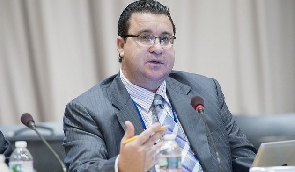 World Bank Country Director, Pierre Laporte
World Bank Country Director, Pierre Laporte
In an attempt to increase Livelihood Empowerment Against Poverty (LEAP) benefits and coverage, the World Bank has given an additional financing support of US$ 150 million under the Ghana Productive Safety Net Project, Country Director for the Bank, Pierre Laporte, has announced.
Speaking at the Learning Event to close out the Ghana Productive Safety Net Project (GPSNP), the Country Director said: “Through a request from the Ministry of Finance, the World Bank will further support government with additional financing to the GPSNP 2, which will aid in increasing Livelihood Empowerment Against Poverty (LEAP) benefits and coverage as well as expanding to reach other important social protection programmes.”
“These efforts are key to aiding us make gains in poverty alleviation and economic growth, despite setbacks in the agenda as a result of the COVID-19 pandemic,” he stated.
Since 2010, the World Bank has consistently supported Ghana’s government in its efforts to protect the poor and boost economic growth. These include the Ghana Social Opportunities Project (GSOP) with US$138.6million; subsequently, the Ghana Productive Safety Net Project (GPSNP) with US$60million; and currently GPSNP 2 with USS$100million initiated in 2022 and closing in 2025. These interventions have cumulatively reached over 2 million poor and vulnerable Ghanaians.
According to the World Bank, government through the Ministry of Gender, Children and Social Protection (MoGCSP) and Ministry of Local Government and Rural Development (MLGRD) has achieved significant milestones in reducing poverty by delivering effective social protection systems as an effort to achieve the Sustainable Development Goals, especially Goal 1.
During the COVID-19 pandemic, existing GPSNP programmes and systems were critical as they were used to speedily identify poor and vulnerable people, and Cash Transfers were successfully delivered to those in need; and there was the Single Window Citizens Engagement Services through which individuals were able to call and seek assistance.
The Country Director mentioned that phone surveys undertaken during and after the COVID-19 pandemic’s peak provided evidence the existing social protection systems were effective in supporting the poor and vulnerable.
The GPSNP was implemented in 2018 and closes in December 2022 – after enhancing Ghana’s efforts toward eradicating poverty and vulnerability through improved social protection systems and services to citizens and strengthening safety net systems that improve productivity for the extreme poor.
The Project interventions included: (i) Productive Inclusion activities; (ii) Labour-intensive Public Works; (iii) Livelihood Empowerment Against Poverty (LEAP) Cash Transfers; (v) Social Protection Systems strengthening including the Ghana National Household Registry (GNHR), the Single Window Citizen Engagement Service (SWCES), and development of management information systems and electronic payments platforms.
As such, the Learning Event will highlight achievements in the digitisation of social protection delivery services; challenges confronting the sector; and lessons learned.
Mr. Laporte highlighted efforts to focus on the strengths of intentionally promoting a digitisation agenda for GPSNP.
“My team tells me that in 2012 LEAP cash transfers were monitored by using paper which was stored in a building at the Headquarters. Today, all services are inputted and tracked by a virtual management information system – which allows the minister, by the click of a button, to know what is happening on the ground. Additionally, the financial capabilities of beneficiaries have been increased because of introductions to bank accounts and saving schemes."
“Looking ahead with an estimation that about 1 million more Ghanaians could fall into poverty by 2050, as a result of climate change, this calls for the development of robust systems. Leveraging technology becomes even more important to first support relief, enable recovery and, most importantly, build resilience among the poor and most vulnerable,” the Country Director stated.